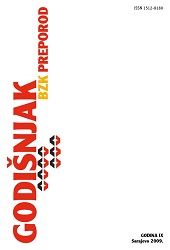Povelja Kulina bana – međunarodna zakletva, diplomatsko-trgovinski ugovor i svjedok vremena
Charter of Kulin ban – International Oath, Diplomatic Agreement and the Witness of Time
Author(s): Fahira Fejzić ČengićSubject(s): Cultural Essay, Political Essay, Societal Essay
Published by: Bošnjačka zajednica kulture "Preporod"
Keywords: Charter of Kulin Ban; Bosnia; Dubrovnik; Bosnian Church; parchment; medieval literacy; archaic-Bosnian language
Summary/Abstract: Charter of Kulin Ban is, according to Serbian academician Simo Ćirković “diplomatic oath” a common form of communication between states and towns in the medieval period. The Charter can be evaluated in a compressed threefold historical framework: that it has been written in the Old-Bosnian language that was first used Slavic name for the town Dubrovnik in the Charter and it has been written in specific Bosnian Cyrillic script. Charter of Kulin Ban, belongs to a different type of Bosnian medieval literacy. It emerged in the Bosnian office and reflected administrative communication Bosnian state with its neighbours. The Charter expresses the presence of a living national language in official communication. But, this language was different from the ecclesiastical language and the standard of Slavic language. Slavic language in Bosnia was significantly adapted to the local speaking circumstances. That language was not similar to today’s spoken languages in Bosnia. But, after the name of the country, it can be said that the Charter was written in Bosnian language and Bosnian Cyrillic script. More precise, that was archaic-Bosnian language, and the monument of the oldest Bosnian-Cyrillic script-Bosančica.
Journal: Godišnjak Bošnjačke zajednice kulture »Preporod«
- Issue Year: 2009
- Issue No: 1
- Page Range: 143-148
- Page Count: 6
- Language: Bosnian

